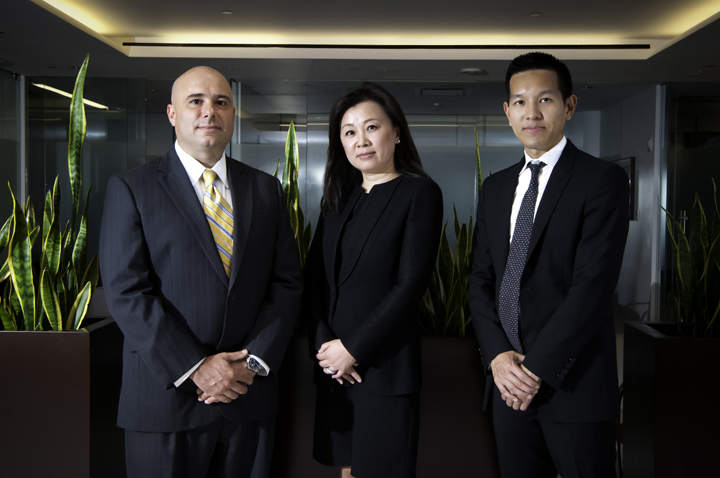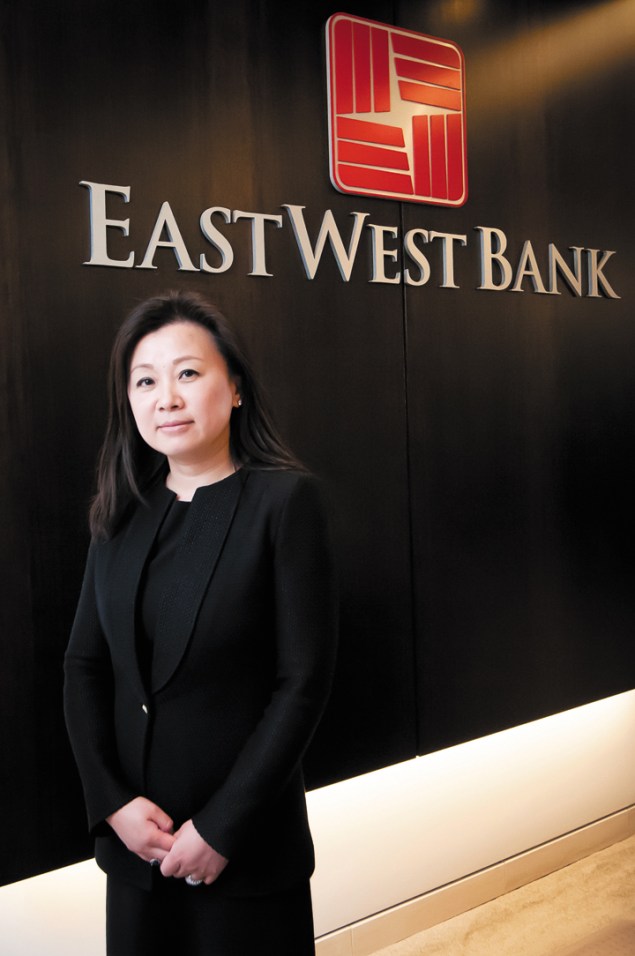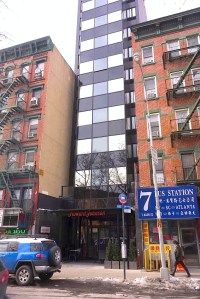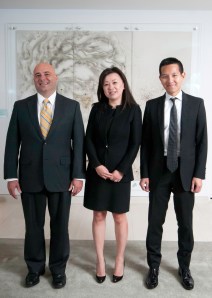East West Bank Poised to Profit as Chinese Money Pours Into the U.S.
By Damian Ghigliotty October 1, 2014 8:35 am
reprints
Wendy Cai-Lee, born in Shanghai, stands in front of a contemporary Chinese mural made from gunpowder, discussing Bill and Melinda Gates’ social influence with two of her senior lenders, Derrick Do, born in Saigon, and Richard Grani, born in Brooklyn, N.Y.
“The Gates have enough money and power to bypass governments when they need to,” Ms. Cai-Lee tells her colleagues.
The team, not exactly your typical group of lenders based in Midtown Manhattan, defies several conventions in the business. Still, the three executives and their 100 colleagues at East West Bank’s New York office are well equipped to target middle-market real estate deals throughout the city’s established and emerging neighborhoods, evidenced by a growing number of deals from the bank in those areas.
Ms. Cai-Lee, who manages a total of 300 employees in 27 offices throughout the bank’s Eastern and Texas regions, tells Mortgage Observer during a series of interviews that she sees untapped opportunities in big cities with mixed economies and mixed cultures, especially those with strong Asian and Asian-American demographics. Texas became part of her territory in September 2013 due to Houston’s thriving energy and technology sectors and its rapidly growing Chinese population.
“We have a unique ability to serve Chinese customers both from a business standpoint and a cultural standpoint,” says Ms. Cai-Lee, 40, who joined the Pasadena, Calif.-based bank in 2011 as its senior managing director for New York. “I would say every six to eight months I have a new territory or new responsibility as a result,” she adds with a laugh.
East West Bancorp, a publicly traded company with more than $27 billion in assets, acts as a financial liaison between the U.S. and China. The parent company of East West grabbed the largest market share of all U.S. banks serving the Chinese-American markets after it acquired the assets of troubled United Commercial Bank in late 2009.
The 41-year-old banking company—with 130 offices in seven states, as well as nine locations in China, Hong Kong and Taiwan—has seen continual earnings growth since then. Likewise, East West never put the brakes on its construction lending business, even during the height of the financial crisis, when many banks stopped lending on real estate altogether.
Ms. Cai-Lee, Mr. Do and Mr. Grani attribute that in large part to the bank’s relationships with particular American and foreign borrowers, namely established middle-market business and property owners. Since joining East West, none of them have entertained originating a $600 million construction loan for a Hudson Yards-level project, they say.
“We’re aggressive with the right relationships,” says Mr. Do. “But we have our parameters on every deal.”
In situations where the bank does not see itself as the right fit for a transaction with a foreign borrower, Ms. Cai-Lee says she and her team will take the extra step of helping that borrower find another lender who might.
“We take an advisory role in those situations,” she says. “We’d rather take a pass on the business and direct them to the right place than screw it up. Our credibility and reputation in this cross-border market outweighs the individual business that we get.”
East West’s chairman and chief executive Dominic Ng has spoken on several occasions about the ways in which good relations between the U.S. and China can benefit both countries’ economies. During a 2012 business awards ceremony in Los Angeles, Mr. Ng touted that China can take “hundreds of million of people below the poverty line and move them up into the middle-class, which now allows them to travel around the world and go on a shopping spree.” He likewise noted that the “United States can help China grow into a more consumer-driven market instead of an export-driven market.”
Ms. Cai-Lee says East West views New York as comparable to Los Angeles, the bank’s top market in its U.S.-China cross-border business, as a growing number of Chinese investors look to acquire and develop properties in the five boroughs, particularly hotels.
“Many Chinese investors and developers come to us first when they are thinking about their first U.S. real estate deal, even if it’s just to get our opinion,” she says.

Ms. Cai-Lee received her bachelor’s degree in economics, finance and East Asian studies from Rutgers University’s Douglass Residential College and started her career as a middle-market analyst at the New Jersey-based Summit Bank in 1995, while she was still in college. From there, Ms. Cai-Lee took a job as an assistant treasurer at J.P. Morgan Chase & Co. in 1996, beginning her investment-banking career. She later joined Citibank in 1998, but quit a year after.
During that time Ms. Cai-Lee also dropped out of Columbia Business School and launched an online start-up called e3Asia. As part of that endeavor she raised $12 million from private equity investors and teamed up with a group of nuclear engineers to develop software that “aggregated consumer purchase power, in some ways similar to Groupon today,” in her words.
After being forced by one of her main investors to sell the company back, right as the dotcom bubble was about to pop, Ms. Cai-Lee took a managing director position at the professional services firm Deloitte, where she stayed for nine years.
“I joined Deloitte in 2001 thinking it was going to be a very short-term thing,” she says. “At the time Deloitte moved its China CEO back to the U.S. to build a global Chinese services business, anticipating China’s growth.”
Ms. Cai-Lee’s commitment in helping build Deloitte’s cross-border China business, prior to China joining the World Trade Organization, eventually led to her coming on board at East West. After she left her position at Deloitte in search of new opportunity, Ms. Cai-Lee was asked by Mr. Ng to join the bank for her “China experience,” she notes.
Among the bank’s multiple real estate deals in the past year was an $8.4 million take-out loan to developer Derek Law in October 2013 to refinance his Howard Johnson Manhattan Soho hotel located at 5 Allen Street.
“East West Bank’s legal lending limit is higher than most local Chinese banks here in New York City and they are very easy to communicate with,” says Mr. Law, a native of Hong Kong, on why he chose East West. “American banks are usually not interested in lending to smaller foreign developers.”
Chinese Connection
With China’s population growing steadily and an increasing number of the country’s citizens exploring business and lifestyle opportunities in the U.S., East West’s investment in its cross-border relationship with China and surrounding countries marks a clear strategy. China, now home to a reported 1.37 billion people as of Sept. 22, 2014, is the largest country in the world by population with 19 percent of all people on earth.
As China’s population grows, the amount of inbound investment from the technically Communist country has also made clear gains, data from Real Capital Analytics and CBRE Group show.

Total Chinese investments in U.S. commercial real estate acquisitions more than tripled from $934.8 million in 2010 to $3.2 billion in 2013, while total investments in New York City acquisitions jumped from $150 million to $2.3 billion in the same period, according to Ben Thypin, RCA’s director of market analysis. Those numbers reflect direct property and land purchases and do not include investments handled through intermediaries, Mr. Thypin says. Factoring in construction and other costs, the actual numbers are even higher.
The monthly magazine the Hurun Report, which tracks Chinese citizens with assets of more than $1 million, revealed in June that more than 60 percent of those it surveyed had moved to another country or were considering doing so in the near future. The U.S. was named the No. 1 destination for wealthy Chinese looking to emigrate with more than 52 percent of the report’s respondents listing it as such. Canada came in second place at 21 percent, while Japan came last at 1 percent.
Hurun’s publisher Rupert Hoogewerf told Fortune at the time that rising concerns about pollution in China and growing desires to invest overseas were his best assumptions as to why.
Ms. Cai-Lee says comparably low interest rates have also incentivized Chinese investors to look at opportunities in North America in recent years. Benchmark interest rates in China are about 24 times as high as those in the States, while average mortgage rates are more than double, according to the website Trading Economics and other data providers.
Hotel acquisitions and developments are especially appealing to Chinese real estate investors since, in most cases, no portion of the assets are sold off or leased out, according to one person familiar with foreign investment trends. “That allows an investor from China to take pride in having total ownership,” that person tells Mortgage Observer on background.
However, when Chinese investors begin negotiations to acquire companies and properties in the states, cultural and language barriers can often cause dilemmas.
“A lot of times they don’t understand the American culture and there are a lot of misunderstandings that may happen,” says Anla Cheng, a senior partner at Sino-Century China Private Equity Partners, a Chinese private equity firm specializing in middle-market investments. (Ms. Cheng’s business partner, Tak-Chuen Clarence Kwan, sits on the board of directors at East West Bancorp.)
“In the United States we are very lawyer-happy,” says Ms. Cheng. “We tend to use lawyers for everything and the contracts tend to be very thick. In China they are very much a can-do society now, and they are used to getting things done very quickly without paying a ton of consultants and lawyers and accountants. Here in the States you have to handhold the Chinese to a certain extent, and Wendy and her team know just how to do that.”
Selective Lending
While East West keeps its doors open to investors and developers from China, Ms. Cai-Lee, Mr. Do and Mr. Grani emphasize that they take a discreet relationship approach when it comes to the projects they will lend on and who they will lend to. The bank’s loan originators give extra due diligence when negotiating deals with foreign investors and developers who lack local expertise or a local join-venture partner, they say. In some cases that means telling a potential high-net-worth customer, “no.”
“Even if you have a 15-year track record in China building residential and commercial properties, you have to understand the building codes in New York. It’s much more stringent here,” says Mr. Do, 40, a first vice president at the bank who oversees the bulk of its New York construction lending.
“When things make sense from a credit and business perspective, we have the flexibility to provide permanent financing, bridge loans and construction loans on all property types,” he says.
Mr. Do, who moved with his family from Saigon to Paris at the age of 7, started his career in the banking business after receiving his M.B.A. from Loyola University Chicago in 2002. He joined East West’s New York office in 2012 from TD Bank, where he had worked as a commercial real estate portfolio manager overseeing about $300 million in loans. He now oversees a portfolio of more than $250 million in addition to originating loans.
Mr. Grani, who started his career at Bank of Scotland in 1998, joined East West’s New York office in 2013 from Lloyds Bank, where a former colleague of his tells Mortgage Observer that Lloyds had been “slowly and painfully exiting a lot of its businesses, including real estate,” after acquiring Bank of Scotland in 2009.
“I saw East West as a healthy growing bank with strong domestic roots, and it appealed much more to me, especially given where I’d come from,” says Mr. Grani, 42, who received his bachelor’s degree from Brooklyn College. “Foreign banks are great when things are going well. When they’re not, suddenly you feel very foreign.”

East West Bank has a portfolio of $20 billion in total loans with $8 billion in commercial real estate loans, as of June 30, 2014. The bank’s Eastern and Texas offices combined share a portfolio of about $1.1 billion, according to Ms. Cai-Lee.
Mr. Grani and Mr. Do typically originate loans between $3 million and $30 million on commercial real estate transactions and offer relatively competitive pricing on short-term construction deals given the New York market, according to the two. Interest rates on such deals generally run between 4.5 and 5.5 percent, they say.
In addition to the East West’s efficiency and clarity when negotiating deals, the bank also takes a responsive approach when saying “no,” Ms. Cai-Lee says.
“From the day one of us receives a call, that person will always get an immediate call back, no matter who it is,” she says. “We see that as a courtesy to the marketplace and we are genuinely interested in learning about what every opportunity is. One thing that is very representative of this bank is that we’re very open-minded with all sorts of business.”
One East Coast region the three bankers do not see East West actively lending in anytime soon is Florida, due to the state’s demographics.
“Miami, where I worked for three years, is a major gateway city, but it’s a Latin American city,” says Mr. Grani. “In that sense, it’s kind of already taken.”
Troubleshooting
Though East West Bank has kept a largely clean record through its carefully vetted projects and borrower relationships, the bank is in the process of resolving litigation resulting from a loan its West Coast offices provided right before the financial crisis.
In September 2014, a Cambodian couple based in the U.S. won a $39 million jury verdict against East West in a lawsuit tied to allegations that the bank had breached a loan contract for a commercial development on Foothill Boulevard in Rancho Cucamonga, Calif.
The borrowers, Choung Fann Yik and his wife Ying Faung Ley, had agreed to a $34.5 million construction loan with East West in 2007 to build Victoria Promenade, a shopping and dinning center with offices, a hotel and a gas station. The couple later sued the bank in June 2011 alleging that East West should have extended the loan after the center opened instead of selling the note, as the bank did.
The judge in that lawsuit has not yet approved the jury’s decision. East West plans to appeal the verdict if that happens, court records show. Ms. Cai-Lee and her teams are not involved in the case.
For the executive vice president and her 300 employees throughout the bank’s Eastern and Texas offices, maintaining fair relationships with borrowers remains a priority, she says.
“We never issue a term sheet that we retract, unless during appraisal something is completely different from what we were told,” says Ms. Cai-Lee. “Likewise, if we tell you we will execute within a certain amount of time, we will do that. That has been key to us winning business in a very competitive market.”
In August 2013, the bank’s New York office provided a $27 million construction loan to the New York-based real estate development firm Ranger Partners for a planned Hilton Garden Inn development at 29-21 41st Avenue in Long Island City, Queens.
“We had a loan commitment from a different, mid-size, bank and we started to lose confidence that they actually understood construction lending, since they kept changing the deal,” Sheldon Stein, Ranger Partners’ managing principal, tells Mortgage Observer. At that point the hotel and condominium developer says he began negotiations with Ms. Cai-Lee’s New York team and pulled out of the deal with the other lender.
Ranger Partners began construction on the Hilton project in December 2012 after acquiring the site for $6.3 million two years prior. The project is in its final phase and the completed hotel is due to open this December, according to Mr. Stein.
“We’re in discussion with East West now about refinancing that deal and we’ve also talked with them about financing other transactions,” he says. “You don’t get the greatest leverage out of them, but they’re very reliable in that when they say they’ll do something, they’ll do it. That’s refreshing compared to a lot of banks.”



